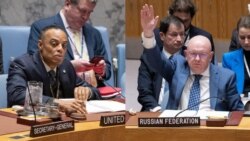The US representative to the United Nations told the UN Security Council on May 29 that the deal now on offer to end the war in Ukraine is the best possible outcome for Russia and that President Vladimir Putin should take it.
Prolonging the war is in no one's interest, said John Kelley, acting US alternate representative to the UN, warning of the possibility that the United States would "consider stepping back" from its negotiation efforts if Russia "makes the wrong decision to continue this catastrophic war."
Kelley added that additional sanctions on Russia are still on the table.
The Kremlin said earlier on May 29 it was awaiting Kyiv's response to its proposal for new talks in Istanbul on June 2.
"As far as I know, no response has been received yet.... We need to wait for a response from the Ukrainian side," Kremlin spokesman Dmitry Peskov said.
Ukrainian President Volodymyr Zelenskyy's top adviser said Ukraine is ready to take part but wants to see Russia's proposals for ending the war first.
"Ukraine is ready to attend the next meeting, but we want to engage in a constructive discussion," said Andriy Yermak in a statement. "This means it is important to receive Russia's draft."
Peskov called that demand "nonconstructive."
Ukraine said it had already submitted its own vision of a peace settlement to Russia.
Zelenskyy accused Russia of engaging in "yet another deception" by failing to hand over its peace proposal ahead of the proposed meeting in Istanbul.
"Even the so-called 'memorandum' they promised and seemingly prepared for more than a week has still not been seen by anyone," Zelenskyy said in his nightly video address.
"Ukraine has not received it. Our partners have not received it. Even Turkey, which hosted the first meeting, has not received the new agenda," he said. "Despite promises to the contrary, first and foremost to the the United States of America, to President Trump: Yet another Russian deception."
Other speakers before the Security Council also addressed the war in Ukraine and the peace process.
UN Undersecretary General for Political Affairs Rosemary DiCarlo told the council that hope is "just barely" alive in the negotiations, and the "cautious hope" she expressed a month ago has diminished in the face of recent aggressions.
The massive wave of attacks over the weekend is a warning of how quickly the war can reach new destructive levels, she said.
“Further escalation would not only aggravate the devastating toll on civilians but also endanger the already challenging peace efforts," DiCarlo said. "The hope that the parties will be able to sit down and negotiate is still alive, but just barely.”
She called for "serious, demonstrable and good faith efforts" to get back on the road that could lead to a just peace.
DiCarlo added that a peace process will not be easy and will take time.
"But it must not wait," she said. "The people of Ukraine, especially, cannot wait."
She said a full, immediate, and unconditional cease-fire is a step that must be part of the peace process.
Russia said it would use the June 2 meeting to present a "memorandum" outlining its terms for a peace settlement.
"Our delegation, led by Vladimir Medinsky, is ready to present a memorandum to the Ukrainian delegation and provide the necessary explanations during a second round of direct talks in Istanbul on Monday, June 2," Russian Foreign Minister Sergei Lavrov said in a statement on May 28.
Lavrov said the memorandum will set out Russia's views "on all aspects of reliably overcoming the root causes of the crisis."
Medinsky, a Russian political scientist and former culture minister, led Russia's negotiating team on May 16 during the first round of direct talks in the more than three years since Russia launched its full-scale invasion of Ukraine.
US Secretary of State Marco Rubio spoke with Lavrov and welcomed a prisoner exchange over the weekend, spokeswoman Tammy Bruce said in a statement.
"The Secretary reiterated President Trump’s calls for constructive, good faith dialogue with Ukraine as the only path to ending this war," Bruce said.
US President Donald Trump warned on May 28 he would determine within "about two weeks" whether Putin is serious about ending the fighting.
"We're going to find out whether or not he's tapping us along or not, and if he is, we'll respond a little bit differently. But it will take about a week and a half, two weeks,” Trump told reporters at the White House.











